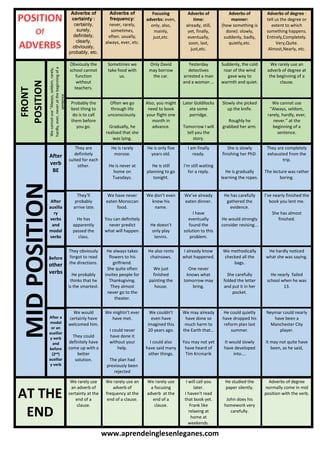
Uses and positions of different types of adverbs
- 1. Adverbs of certainty : certainly, surely, definitely, clearly, obviously, probably, etc. Adverbs of frequency: never, rarely, sometimes, often. usually, always, ever, etc. Focusing adverbs: even, only, also, mainly, just,etc. Adverbs of time: already, still, yet, finally, eventually, soon, last, just,etc. Adverbs of manner: (how something is done): slowly, suddenly, badly, quietly,etc. Adverbs of degree : tell us the degree or extent to which something happens. Entirely,Completely. Very,Quite. Almost,Nearly, etc. FRONT POSITION Wecannotuse“Always,seldom,rarely, hardly,ever,never.atthebeginningofa sentence Obviously the school cannot function without teachers. Sometimes we take food with us. Only David may borrow the car. Yesterday detectives arrested a man and a woman … Suddenly, the cold roar of the wind gave way to warmth and quiet. We rarely use an adverb of degree at the beginning of a clause. Probably the best thing to do is to call them before you go. Often we go through life unconsciously. Gradually, he realised that she was lying. Also, you might need to book your flight one month in advance. Later Goldilocks ate some porridge. Tomorrow I will tell you the story. Slowly she picked up the knife. Roughly he grabbed her arm. We cannot use “Always, seldom, rarely, hardly, ever, never.” at the beginning of a sentence. MIDPOSITION After verb BE They are definitely suited for each other. He is rarely morose. He is never at home on Tuesdays. He is only five years old. He is still planning to go tonight. I am finally ready. I'm still waiting for a reply. She is slowly finishing her PhD. He is gradually learning the ropes. They are completely exhausted from the trip. The lecture was rather boring. After auxilia ry verbs and modal verbs They’ll probably arrive late. He has apparently passed the class. We have never eaten Moroccan food. You can definitely never predict what will happen. We don’t even know his name. He doesn’t only play tennis. We’ve already eaten dinner. I have eventually found the solution to this problem. He has carefully gathered the evidence. He would strongly consider revising… I’ve nearly finished the book you lent me. She has almost finished. Before other verbs They obviously forgot to read the directions. He probably thinks that he is the smartest. He always takes flowers to his girlfriend. She quite often invites people for Thanksgiving. They almost never go to the theater. He also rents chainsaws. We just finished painting the house. I already know what happened. One never knows what tomorrow may bring. We methodically checked all the bags. She carefully folded the letter and put it in her pocket. He hardly noticed what she was saying. He nearly failed school when he was 13. After a modal or an auxiliar y verb and before (2nd) auxiliar y verb We would certainly have welcomed him. They could definitely have come up with a better solution. We mightn’t ever have met. I could never have done it without your help. The plan had previously been rejected We couldn't even have imagined this 20 years ago. I could also have said many other things. We may already have done so much harm to the Earth that… You may not yet have heard of Tim Krcmarik He could quietly have dropped his reform plan last summer. It would slowly have developed into…. Neymar could nearly have been a Manchester City player. It may not quite have been, as he said, AT THE END We rarely use an adverb of certainty at the end of a clause. We rarely use an adverb of frequency at the end of a clause. We rarely use a focusing adverb at the end of a clause. I will call you later. I haven't read that book yet. Frank like relaxing at home at weekends. He studied the paper silently. John does his homework very carefully. Adverbs of degree normally come in mid position with the verb. www.aprendeinglesenleganes.com
